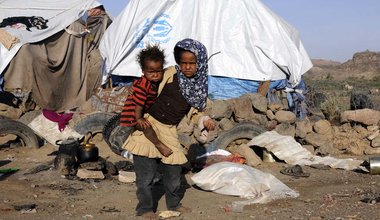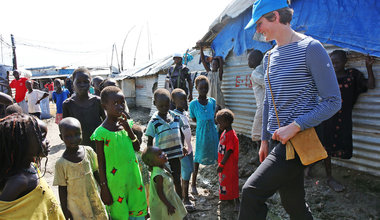Three years into conflict, humanitarian needs in South Sudan continue to rise – UN relief wing
 Since fighting first erupted in South Sudan three years back, tens of thousands have died, food insecurity and acute malnutrition are at unprecedented levels, and more than three million have been driven from their homes the United Nations humanitarian arm has reported.
Since fighting first erupted in South Sudan three years back, tens of thousands have died, food insecurity and acute malnutrition are at unprecedented levels, and more than three million have been driven from their homes the United Nations humanitarian arm has reported.
According to a humanitarian bulletin on South Sudan, issued by the UN Office for Coordination of Humanitarian Affairs (OCHA), the fighting and economic decline in the world's youngest nation have also made millions of its people more susceptible to disease.
We are now witnessing a scale of need for assistance and protection that demands our urgent, relentless attention and actionUN Emergency Relief Coordinator Stephen O';Brien, briefing the Security Council
This year, more than 2 million cases of malaria were reported between January and November, and a cholera outbreak caused some 3,525 cases in nine locations, all figures higher than those the previous year.
Furthermore, a measles outbreak has been confirmed in Wau, Western Bahr el Ghazal state, bringing the number of country-wide outbreaks in 2016 to 13, more than twice the number in 2015 (5).
Growing insecurity
On 13 December alone, 7,046 people from South Sudan crossed the border into Uganda seeking refuge.
Many refugees leaving South Sudan reported that they left due to the deteriorating security situation, including fighting in Yei and Wonduruba areas, looting of properties, and rumours of
upcoming attacks by armed actors in the Equatorias. They also spoke of horrific abuses, including rape, abduction and killing, the bulletin mentioned.
Women and children continued to remain the most vulnerable and accounted for nearly 86 per cent of the total number reaching Uganda.
Meanwhile, civilians continue to be displaced within the country. For instance, in Western Equatoria state, there are now an estimated 28,000 people displaced from Yambio, 16,000 displaced from Ezo, and 50,000 displaced from Mundri East, Mundri West and Mvolo.
Also, more than 17,000 children are estimated to have been recruited by armed actors, including some 1,300 recruited in 2016 and civilians arriving as refugees into neighbouring countries.
Challenges for humanitarian action
Humanitarian organizations and personnel too reported significant challenges reaching people who desperately need aid. Some roads in the Eastern Equatoria state were described as impassable for security reasons while in other places, humanitarian convoys had to spend hours negotiating access.
Minimum conditions must be met to be able to fund and implement humanitarian operations. If these conditions continue to not be met, it will ultimately undermine the ability of humanitarian organizations to save livesHumanitarian Country Team
Particularly worrying, according to the Humanitarian Country Team –; which is made up of representatives of the UN and other international humanitarian organizations and various non-governmental organizations –;was the expulsion of the Country Director of a humanitarian organization and the order for a second senior staff of the same organization to leave the country.
According to the UN humanitarian wing, between January to November this year, 831 humanitarian access incidents were reported, including 66 incidents of looting of humanitarian supplies.
For instance, in Unite State's Nhialdu area, where fighting in November had forced the relocation of humanitarian staff on the ground, tents and supplies at a relief “;light-weight”; base camp (amounting to some $100,000) were completely looted, shelters were destroyed, and the market burnt down. Unexploded ordnance were found in the area as a result of the fighting.
Funding, too continues to remain a major challenge, with just ten days left in 2016, only 83 per cent ($1.1 billion) of the humanitarian appeal for the country ($1.29 billion) has been received.
 UN
UN








